- Home
- Jeff Lindsay
Dexter by Design Page 17
Dexter by Design Read online
Page 17
“I wanted to, you know,” I said.
“Kill him?” he said, and the words hit me with an icy shock.
“No,” I said. “Just, just—”
“Read him his rights?” said Coulter. “Handcuff him? Ask him some tough questions? Blow up his house?”
“I guess, um,” I said, as if reluctantly letting out ugly truth. “I wanted to, you know. Rough him up a little.”
“Uh-huh,” said Coulter. “And then what?”
I shrugged, feeling somewhat like a teenage boy caught with a condom. “Then bring him in,” I said.
“Not kill him?” Coulter said, raising one badly trimmed eyebrow.
“No,” I said. “How could I, um …?”
“Not stick a knife in him and say, This is for what you did to my sister?”
“Come on, Detective. Me?” And I didn’t quite bat my eyes at him, but I did my best to look like the charter member of the Geek Patrol that I was in my secret identity.
And Coulter simply stared at me for a long and very uncomfortable minute. Then he shook his head again. “I dunno, Dex,” he said. “Doesn’t really add up.”
I gave him a look of pained confusion, which wasn’t entirely acting. “What do you mean?”
He took another swig of soda. “You always play by the rules,” he said. “Your sister’s a cop. Your dad was a cop. You never get in any kind of trouble, ever. Mr. Boy Scout. And now you decide you’re Rambo?” He made a face as if somebody had put garlic in his Mountain Dew. “Am I missing something? You know, something that makes sense?”
“She’s my sister,” I said, and it sounded incredibly feeble, even to me.
“Yeah, I got that already,” he said. “You got nothing else?”
I felt trapped in slow motion while large and ponderous things whizzed past me. My head throbbed and my tongue was too thick, and all my legendary cleverness had deserted me. Coulter watched me as I numbly and painfully shook my head, and I thought, This is a very dangerous man. But out loud, all I could manage was, “I’m sorry.”
He looked at me for just a moment longer, then turned away. “I think maybe Doakes was right about you,” he said, and then he walked across the street to talk to the firefighters.
Well. The mention of Doakes was the perfect end to an absolutely enchanting conversation. I just barely stopped myself from shaking my head again, but the temptation was strong, because it seemed to me that what had been a sane and well-ordered universe just a few days ago was suddenly beginning to spin wildly out of control. First I walked into a trap and nearly turned into the Inhuman Torch, and then a man I had regarded as a foot soldier in the war against intelligence turned out to be a covert general—and to top it off, he was apparently in league with the last few living pieces of my nemesis, Sergeant Doakes, and he seemed very likely to take up where Doakes had left off, in the pursuit of poor persecuted Dexter. Where would this end?
And if this was not bad enough—which, frankly, I thought it was—I was still in terrible danger from Weiss and whatever his plan of attack might be.
All in all, it occurred to me that this would be a very good time to be somebody else. Unfortunately, that was a trick I had so far failed to master. With nothing else to do except ponder the almost certain doom headed toward me at such terrible speed from so many different directions, I walked down the block to my car. And of course, because apparently I had not suffered nearly enough, a slim and ghostly figure came off the curb and glided into step beside me.
“You were here when this happened,” said Israel Salguero.
“Yes,” I said, wondering if next a satellite would fall from orbit and onto my head.
He was silent for a moment and then he stopped walking, and I turned to face him. “You know I am not investigating you,” he said.
I thought that was very nice to hear, but considering how things had gone the last few hours, I thought it would be best just to nod, so I did.
“But apparently what happened here is connected to the incident involving your sister, and that I am investigating,” he said, and I was glad I hadn’t said anything. So glad, in fact, that I decided that silence would be a good policy to continue.
“You know that one of the most important things I am charged to uncover is any kind of vigilante activity on the part of any of our officers,” he said.
“Yes,” I said. After all, only one word.
He nodded. He still had not taken his eyes off my face.
“Your sister has a very promising career ahead of her,” he said. “It would be a very great shame if something like this hurt her.”
“She’s still unconscious,” I said. “She hasn’t done anything.”
“No, she hasn’t done anything,” he said. “What about you?”
“I just tried to find the guy who stabbed her,” I said. “I didn’t do anything wrong.”
“Of course,” he said. He waited for me to say something else, but I didn’t, and so after what seemed like several weeks, he smiled and patted my arm and walked away across the street to where Coulter was standing and swigging from his Mountain Dew bottle. I watched as the two of them spoke, turned to face me, and then turned away again to look at the smoldering house. And thinking that this afternoon couldn’t possibly get any better, I turned and trudged to my car.
The windshield was cracked from a flying piece of house.
I managed not to burst into tears. I got in and drove home, peering through the cracked glass and listening to my head throb.
TWENTY-THREE
RITA WAS NOT HOME YET WHEN I ARRIVED, SINCE I’D gotten there a bit early as a result of my explosive misfortune. The house seemed very empty, and I stood inside the front door for a minute just listening to the unnatural silence. A pipe ticked in the back of the house, and then the air conditioner came on, but these were not living sounds and I still felt as if I had stumbled into a movie where everyone else had been whisked away in a spaceship. The lump on my head was still throbbing, and I was very tired and very alone. I went to the couch and fell onto it as if I suddenly had no bones left to hold me up.
I lay there for some time in a kind of strange interval in the urgency. I knew I still had to explode into action, track down Weiss, head him off at the pass, and beard him in his den, but for some reason I was completely unable to move, and the mean little voice that had been urging me on did not sound terribly convincing at the moment, as if it, too, needed a coffee break. So I just lay there, facedown, trying to feel the sense of emergency that had deserted me, and failing to feel anything except, as mentioned, fatigue and pain. And if somebody had shouted at me, “Look out behind you! He’s got a gun!” I would have replied with no more than a weary mumble, “Tell him to take a number and wait.”
I woke up, I don’t know how much later, to an overwhelming sense of blue, which made no sense at all until I was able to focus my eyes. And there stood Cody, no more than six inches away from my head, in his apparently brand-new Cub Scout uniform. I sat up, which caused my head to clang like a gong, and looked at him.
“Well,” I said. “You certainly look official.”
“Look stupid,” he said. “Shorts.”
I looked at him in his dark blue shirt and shorts, the little hat perched on top of his head and the neckerchief in its slide around his neck, and it didn’t seem fair to pick on the shorts. “What’s wrong with shorts?” I said. “You wear shorts all the time.”
“Uniform shorts,” he said, as if it was some kind of impossible assault on the last frontier of human dignity.
“Lots of people wear uniform shorts,” I said, desperately flinging my battered brain through its paces in search of an example.
Cody looked very doubtful. “Who?” he said.
“Well, ah, the mailman wears shorts—” I broke off quickly; the look he was giving me was louder and more pointed than anything he could have said. “And, um, the British soldiers wore shorts in India,” I said, with incredibly feeble hope.
He stared at me for a moment longer without saying anything, as if I had let him down badly when all the chips were on the table. And before I could think of another brilliant example, Rita came charging into the room.
“Oh, Cody, you didn’t wake him up, did you? Hello, Dexter, we’ve been shopping, we got ALL the things Cody needs for the Cub Scouts, he doesn’t like the shorts, I think because Astor said something, my God, what happened to your head?” she said, running through two octaves and eight emotions without breathing.
“It’s nothing,” I said, “just a flesh wound,” which was something I’d always wanted to say, even though I didn’t really know what that meant. Weren’t ALL wounds flesh wounds, unless they bypassed the flesh somehow and went right to the bone?
Nevertheless, Rita responded with a gratifying circus of concern, shooing away Cody and Astor and getting me an ice pack, a comforter, and a cup of tea before flinging herself down beside me on the couch and demanding to know what had happened to my poor dear head. I filled her in on all the dreadful details—leaving out one or two things with no real relevance, like what I had been doing at a house that blew up in an attempt to kill me—and as I spoke, I watched with dismay as her eyes got big and moist, until they began to overflow and tears ran down her cheeks and across her face. It was really quite flattering to think that minor damage to my skull could cause such a display of hydrotechnics, but at the same time it left me slightly uneasy about what my response ought to be.
Luckily for my reputation as a Method actor, Rita left me in no doubt at all about how I should behave. “You stay right here and rest,” she said. “Quiet and rest when you get a bump on the head like that. I’m going to make you some soup.”
I had not known that soup was good for concussions, but Rita seemed very sure about it, and with a few gentle strokes on my face and a light kiss near the bump, she was off the couch and into the kitchen, where she immediately began a muted clatter that very soon smelled like garlic, onion, and then chicken, and I drifted into a state of half sleep where even the faint throbbing of my head seemed distant, cozy, and almost pleasant. I wondered if Rita would bring me soup if I was arrested. I wondered if Weiss had anyone to bring him soup. I hoped not—I was starting to dislike him, and he certainly didn’t deserve soup.
Astor suddenly appeared beside the couch, interrupting my reverie. “Mom says you got hit on the head,” she said.
“Yes, that’s right,” I said.
“Can I see it?” she asked, and I was so deeply touched by her concern that I bowed my head to reveal the lump and the matted hair around it where it had bled. “It doesn’t look so bad,” she said, sounding a little disappointed.
“It isn’t,” I told her.
“So you’re not going to die, are you?” she asked politely.
“Not yet,” I said. “Not until after you do your homework.”
She nodded, glanced toward the kitchen, and said, “I hate math.” Then she wandered away down the hall, presumably to hate her math at closer range.
I drifted awhile longer. The soup finally came, and while I would not absolutely insist that it was good for my head injury, it certainly did me no harm. As I may have mentioned before, Rita in the kitchen can do things that are far beyond mortal ken, and after a big portion of her chicken soup I began to think that the world at large might deserve one last chance. She fussed over me the whole time, which was not really my favorite thing, but at the moment it seemed kind of soothing and I let her fluff the pillows, mop my brow with a cool cloth, and rub my neck when the soup was all gone.
Before too long, the entire evening had passed, and Cody and Astor came in to say muted good nights. Rita herded them away to bed and tucked them in, and I staggered down the hall to the bathroom to brush my teeth. Just as I got the toothbrush going in a really good rhythm, I caught sight of myself in the mirror over the sink. My hair stuck up in all directions, there was a bruise on one cheek, and the normal sprightly emptiness of my eyes seemed hollow. I looked like a very unflattering mug shot, the kind where the recently arrested is still sobering up and trying to figure out what he did and how he got caught. I hoped it was not an omen of what was to come.
In spite of an evening of nothing more strenuous than lounging on the couch and dozing, I was nearly overwhelmed with sleepiness, and the toothbrushing had taken the last of my energy. Still, I made it all the way to the bed under my own power, and I flopped down onto the pillows thinking that I would just drift off into slumberland and worry about everything else in the morning. But alas, Rita had other plans.
After the hushed murmur of bedtime prayers had died away down the hall in the children’s room, I heard her come into the bathroom and run water for a while, and I had almost fallen asleep when the sheets rustled and something that smelled like very aggressive orchids slid into bed beside me.
“How do you feel?” Rita said.
“Much better,” I said, and giving credit where it was due, I added, “The soup seemed to help.”
“Good,” she whispered, and she put her head down on my chest. For a while she just lay there, and I could feel her breath blowing across my chest and I wondered if I could really get to sleep with the weight of her head pressed onto my ribs like that. But then the pattern of her breathing changed, got slightly percussive, and I realized she was crying.
There are few things in the world that make me feel more clueless than a woman’s tears. I know that I am supposed to do something comforting and then go slay whatever dragon caused the crying fit, but it has been my experience, in my limited dealings with women, that the tears never come when they should, and they are never about what you might think, and consequently you are reduced to truly stupid options like patting her head and saying, “There there,” in the hopes that at some point she will let you in on what the display is actually about.
But Dexter is nothing if not a team player, and so I slid my arm up across her back, put the palm of my hand on her head, and patted. “It’s okay,” I said, and no matter how stupid that sounded, I thought it was a tremendous improvement over “there there.”
And true to form, Rita’s reply came out of absolutely nowhere that I could hope to predict. “I can’t lose you,” she said.
I certainly had no plans to be lost, and I would gladly have told her so, but she was just hitting her stride now, and the silent sobs were jerking her body and sending a small rivulet of salt water rolling down my chest. “Oh, Dexter,” she sobbed, “what would I do if I lost you, too?”
And now, with that word too, I had somehow joined a completely unexpected and unknown company, presumably of people Rita had carelessly left lying around where they had been easily lost, and she had given me no clue how I had managed to get a seat with that group, or even who they were. Did she mean her first husband, the addict who had beaten and tormented her, Cody, and Astor, until they were traumatized into becoming my ideal family? He was in prison now, and I certainly agreed that being lost that way was a bad idea. Or was there some other string of misplaced persons who had slipped through the cracks of Rita’s life and been washed away by the rains of mischance?
And then, as if I needed further proof that her thoughts were being beamed to her from a mother ship in orbit beyond Pluto, Rita began to slide her face down my chest, across my stomach—still sobbing, you understand, and leaving a trail of tears that quickly turned cool.
“Just lie still,” she sniffled. “You shouldn’t exert yourself with a concussion.”
As I said, you never really know what the program is going to be when a woman switches on the tears.
TWENTY-FOUR
IN THE MIDDLE OF THE NIGHT I WOKE UP AND THOUGHT, But what does he want? I don’t know why I hadn’t asked that question before, and I don’t know why it came to me now, lying in my comfy bed next to a gently snoring Rita. But there it was—it was bobbling around on the surface of Lake Dexter now, and I had to do something with it. The inside of my head still felt stiff, as if it was pac
ked with wet sand, and for several minutes I lay there unable to do anything with my thought except to repeat it: What does he want?
What did Weiss want? He was not simply feeding a Passenger of his own, I was reasonably sure of that. I had felt no sympathy twinges from my own anywhere near either Weiss or his handiwork, which ordinarily I would, in the presence of another Presence.
And the way he went about it, starting with already-dead bodies instead of creating his own—until he had killed Deutsch—argued that he was after something altogether different.
But what? He made videos of the bodies. He made videos of people looking at the bodies. And he had made a video of me at play—unique footage, yes, but it all added up to nothing that made any sense to me. Where was the fun in all that? I saw none—and that made it impossible for me to get inside Weiss’s head and figure him out. With normal, well-adjusted psychopaths who killed because they must and took a simple, honest pleasure from their work, I never had that problem. I understood them all too well, since I was one. But with Weiss, there was no point of contact, no place to feel empathy, and because of that I had no idea of where he would go or what he would do next. I had a very bad feeling that whatever it was, I would not like it—but I had no feeling at all of what it would be, and I didn’t like that at all.
I lay there in bed for a while thinking about it—or trying to think about it, since the good ship Dexter was clearly not yet ready to raise full steam. Nothing came to me. I didn’t know what he wanted. I didn’t know what he would do next. Coulter was out to get me. So was Salguero, and of course, Doakes had never given up. Debs was still in a coma.
On the plus side, Rita had made me some very good soup. She was really very good to me—she deserved better, even though she clearly didn’t know that. She thought she had everything, apparently, between me, the children, and our recent trip to Paris. And although she did, in fact, have these things, none of them remotely resembled what she thought they were. She was like a mother lamb in a wolf pack, and she only saw white fluffy wool all around her when in fact the pack was licking its lips and waiting for her to turn her back. Dexter, Cody, and Astor were monsters. And Paris—well, they did actually speak French there, just as she had hoped. But Paris had proved to have its own unique kind of monster, too, as our wonderful interval at the art gallery had shown. What was it called? Jennifer’s Leg. Very interesting; after all my years of toiling in the fields it was still possible for me to see something that surprised me, and for that reason I felt a certain warmth for Paris nowadays.

 Double Dexter
Double Dexter Darkly Dreaming Dexter
Darkly Dreaming Dexter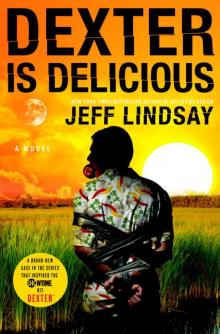 Dexter Is Delicious
Dexter Is Delicious Tropical Depression
Tropical Depression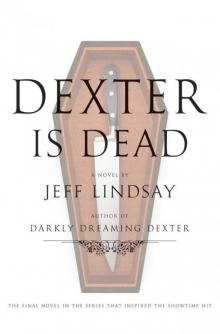 Dexter Is Dead
Dexter Is Dead Dexter's Final Cut
Dexter's Final Cut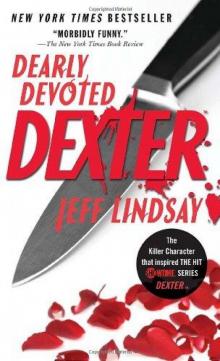 Dearly Devoted Dexter
Dearly Devoted Dexter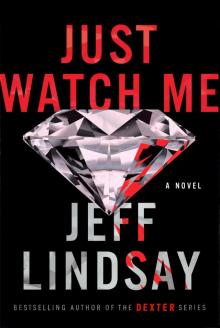 Just Watch Me
Just Watch Me Red Tide
Red Tide Double Dexter: A Novel
Double Dexter: A Novel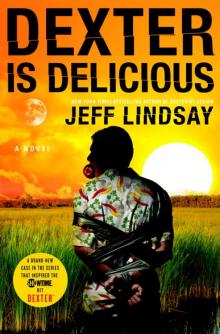 Dexter is Delicious: A Novel
Dexter is Delicious: A Novel Dexter's Final Cut d-7
Dexter's Final Cut d-7